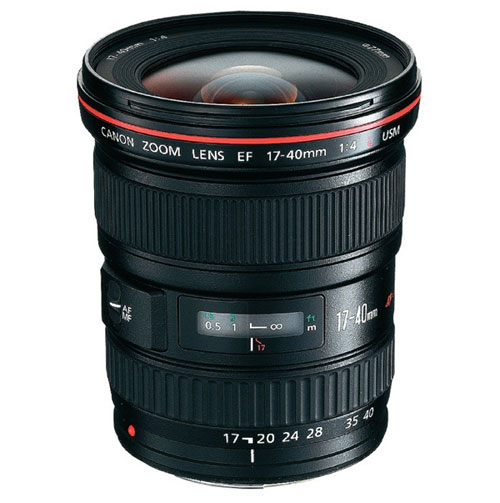Canon EF 17-40mm f/4.0L USM
 |
| Gary Wolstenholme takes a look at this popular lightweight ultra-wide angle zoom lens, which has a constant aperture of f/4, an Ultrasonic focusing motor and sealing against the elements. |
Canon's 17-40mm f/4L has been a popular choice due to its lightweight design, and lower cost than to buy than Canon's f/2.8 wide angle. This lens can be picked up for around £540, which is bargainous for a professional quality zoom lens. When used on an APS-C format camera this lens also makes quite a nifty standard zoom, as the 17-40mm range provides the equivalent angle of view of roughly a 27- 64mm lens on a full frame camera.
Alternatives include Canon's EF 16-35mm f/2.8 MkII, which has a brighter constant aperture but costs around £1000. It also has weather sealing and an Ultrasonic focusing motor like the 17-40mm.
Barely any of the major third party manufacturers currently offer a lens covering this range that will cover a full frame sensor as Sigma and Tamron have discontinued their 17-35mm offerings.
Tokina have recently announced a 16-28mm f/2.8 wide angle lens, which has a silent focusing motor, but no full-time manual focus facility. There is currently no price information on this lens so we wait to see whether it will be a comparable choice.
Canon EF 17-40mm f/4.0L USM: Handling and features
Weighing only 500g, the 17-40mm f/4L is probably among the lightest L series zoom lenses available at present. The signature red stripe around the end of the lens barrel reminds you that this is considered one of Canon's professional spec lenses.
The barrel has a tough textured finish that should resist showing marks plus the dust and weather sealing should make the lens able to withstand the rigours of daily professional use. The front element moves back and forth inside the end of the lens, which means the overall length does not change during zooming. Focusing is also performed internally, so polarising filters should be easy enough to use.
The rubberised zoom and focus rings are quite narrow compared to a lot of newer lens designs, but they are still easy to operate. The zoom control has little resistance and doesn't suffer from zoom creep either, which will please tripod shooters. The focus ring is nicely damped, and as the focus motor's an Ultrasonic one, manual adjustments can be made at any time.
Focusing is very quick, even for a wide angle lens, and seemed to be accurate pretty much all of the time. The closest focus distance is a mere 28cm, allowing you to get in close to your subject to exploit the distorted perspective that characterises ultra-wide lenses.
Overall I really enjoyed using this lens due to its excellent build, fast focusing and light weight.
Canon EF 17-40mm f/4.0L USM: Performance
During testing, this optic proved itself capable of producing images of excellent sharpness across the frame at optimum apertures. At 17mm, the centre sharpness at maximum aperture is already excellent and the quality towards the edges is acceptable. One strange aspect of the images produced by this lens I noticed was that right out into the corners at f/4 apertures the sharpness drops off very suddenly. Stopping down seems to go some way to resolving this, but not completely. At 17mm peak quality is achieved at f/8, although again the far corners appear very soft. The transition from sharp to soft is very sudden, almost like a circular vignette just creeping into the edges of the image area.
Zooming to 28mm seems to resolve the issue with soft corners, and although the quality towards the edges isn't excellent at f/4, it is still good. Stopping down improves the quality towards the edges dramatically and peak quality is also achieved at f/8 at this focal length.
Finally at 40mm the difference in quality between the centre of the image and towards the edges of the image becomes greater, although the issue with sudden softness in the very far corners appears to have vanished. Peak quality across the frame is now at f/11 where the centre is very good, and the quality towards the edges not too far behind.
At 17mm, Imatest recorded chromatic aberrations covering up to 0.79 pixel widths. This level may be acceptable in many cases, but may show in large prints with high contrast areas towards the edge of the frame. Zooming through the range decreases the level of fringing to well within acceptable levels.
Falloff of illumination towards the corners is quite pronounced at f/4 and 17mm. Here the corners are 2.57stops darker than the image centre. The lens needs to be stopped down as far as f/8 results to achieve visually uniform illumination here. The level of vignetting is reduced at 40mm with the corners only being 1.37stops darker than the image centre at f/4 and visually uniform by f/5.6.
As I'd normally expect for an ultra-wide lens, distortion at 17mm is quite pronounced. Here Imatest recorded 7.46% barrel distortion, which is quite high, but not uncharacteristic for a lens of this type. Unfortunately the curvature increases towards the corners in a non-uniform fashion, which may make it difficult to completely correct the effect in image editing software afterwards. At 40mm very mild pincushion distortion is present. Here Imatest recorded a level of 0.303%, which will be barely noticeable in most cases.
Even when shooting directly into the light, the 17-40mm f/4.0L USM seems quite resistance to flare and loss of contrast. A large scalloped hood is provided to provide protection from extraneous light. The EW-83E hood is huge and the petals are round at the front, which can make it difficult to put the lens down. It certainly does its job though and the interior is lined with a black velvety material to stop any unwanted reflections.
Canon EF 17-40mm f/4.0L USM: Verdict
It's hard to write a succinct round-up for this lens, as it really depends on the kind of photography you do and the type of camera you are using as to whether I'd recommend this lens. For example, if you shoot subjects which require sharp details right into the corners and low distortion, such as some landscape work, or architecture, this lens may be quite frustrating for you. The reason I say frustrating, rather than unsuitable is because the lens handles well, is superbly built and shows excellent sharpness in the centre, and even towards the edges of the frame at 17mm. It's the sudden drop in quality in the far corners that is a little disturbing.
If however you use the lens in a way that wouldn’t be affected by this, such as on an APS-C digital SLR or one of their 1.3x crop models, this lens provides superb quality for quite a reasonable price.
Canon's UK website says itself: "It is especially well suited for use with digital EOS SLR cameras with a focal length conversion factor higher than 1."
If considering this lens, I'd take heed of their advice and you won't be disappointed either way.
Canon EF 17-40mm f/4.0L USM: Pros
 Superb performance in the centre throughout the range
Superb performance in the centre throughout the range Well built
Well built Lightweight
LightweightCanon EF 17-40mm f/4.0L USM: Cons
 Sudden softness in the corners may disturb full-frame SLR users
Sudden softness in the corners may disturb full-frame SLR users Distortion difficult to correct entirely at 17mm
Distortion difficult to correct entirely at 17mm Falloff at 17mm
Falloff at 17mm| FEATURES |  |
| HANDLING |  |
| PERFORMANCE (full frame) |  |
| PERFORMANCE (crop sensor) |  |
| VALUE |  |
| OVERALL |  |
Canon EF 17-40mm f/4.0L USM: Lens specification
| Price | £540.00 |
| Contact | www.canon.co.uk |
| Filter size | 77mm |
| Format | Full-frame |
| Construction | 12 elements in 9 groups |
| Angle-of-view | 104° - 57°30' |
| 35mm equivalent focal length (on APS-C body) | 27-64mm |
| Internal focusing | Yes |
| Image stabilisation | No |
| Minimum focus | 28cm |
| Maximum aperture | f/4 |
| Minimum aperture | f/22 |
| Weight | 500g |
| Size | 83.5 x 96.8mm |
| In the box | EW-83E Lens Hood |
The Canon EF 17-40mm f/4.0L USM costs around £540 and is available from Warehouse Express here:
Canon EF 17-40mm f/4.0L USM
Add your message
Login required
Please login here or if you've not registered, you can register here. Registering is safe, quick and free.
Please login here or if you've not registered, you can register here. Registering is safe, quick and free.
photodo Stats
1102 lenses
428 MTF tests
74 in-depth photodo reviews
100+ users join each day
Help the lens community by reviewing or rating a lens today via our lens search
428 MTF tests
74 in-depth photodo reviews
100+ users join each day
Help the lens community by reviewing or rating a lens today via our lens search
Latest Lens Reviews
- Chinon 28mm f/2.8 Vintage Lens Review
- Canon EF 70-200mm f/4L IS II USM Lens Review
- Samyang AF 85mm f/1.4 EF Review
- Sigma 70mm f/2.8 DG Macro Art Review
- Samyang AF 24mm f/2.8 FE Review
- Meike 50mm f/1.7 Review
- Tamron 70-210mm f/4 Di VC USD Review
- Lensbaby Burnside 35mm f/2.8 Review
- Asahi Super Takumar 50mm f/1.4 Review
- Asahi Super-Multi-Coated Takumar 135mm f/3.5 Review








